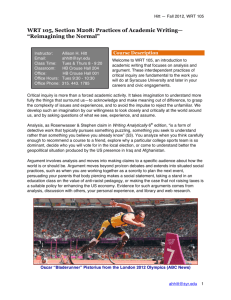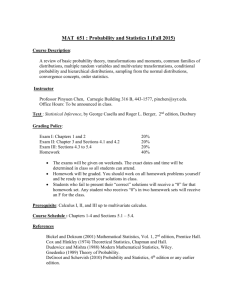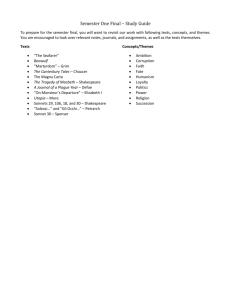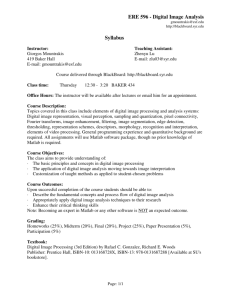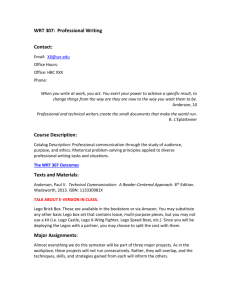Writing 205: Everyday Representations of Disability
advertisement
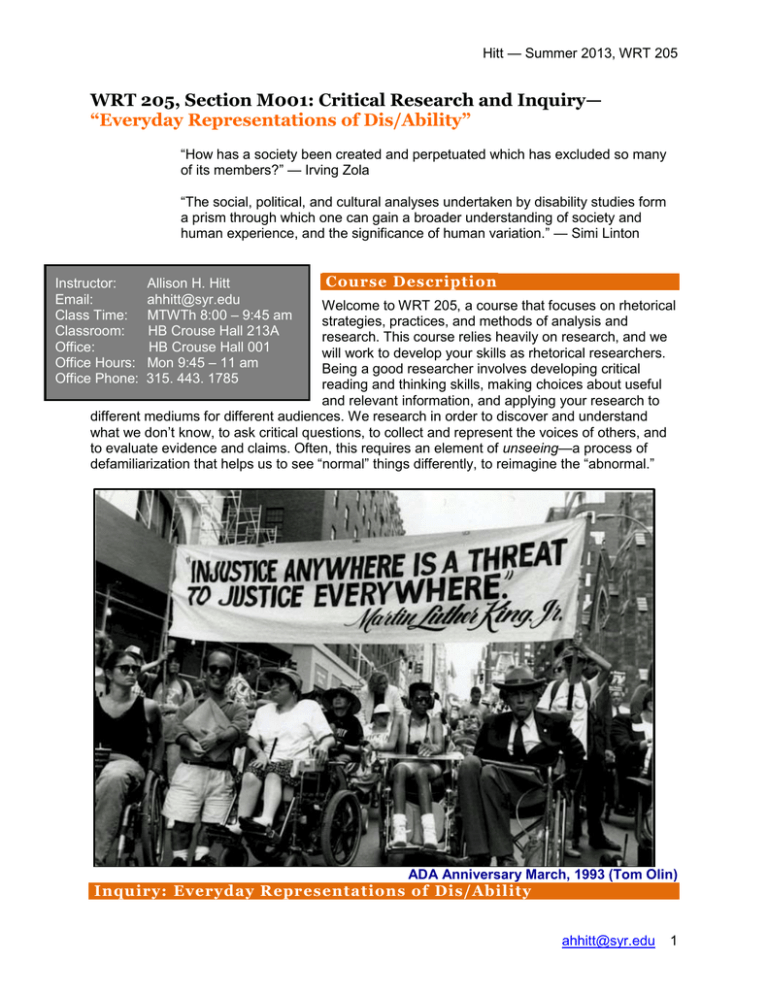
Hitt — Summer 2013, WRT 205 WRT 205, Section M001: Critical Research and Inquiry— “Everyday Representations of Dis/Ability” “How has a society been created and perpetuated which has excluded so many of its members?” — Irving Zola “The social, political, and cultural analyses undertaken by disability studies form a prism through which one can gain a broader understanding of society and human experience, and the significance of human variation.” — Simi Linton Instructor: Email: Class Time: Classroom: Office: Office Hours: Office Phone: Allison H. Hitt ahhitt@syr.edu MTWTh 8:00 – 9:45 am HB Crouse Hall 213A HB Crouse Hall 001 Mon 9:45 – 11 am 315. 443. 1785 Course Description Welcome to WRT 205, a course that focuses on rhetorical strategies, practices, and methods of analysis and research. This course relies heavily on research, and we will work to develop your skills as rhetorical researchers. Being a good researcher involves developing critical reading and thinking skills, making choices about useful and relevant information, and applying your research to different mediums for different audiences. We research in order to discover and understand what we don’t know, to ask critical questions, to collect and represent the voices of others, and to evaluate evidence and claims. Often, this requires an element of unseeing—a process of defamiliarization that helps us to see “normal” things differently, to reimagine the “abnormal.” ADA Anniversary March, 1993 (Tom Olin) Inquiry: Everyday Representations of Dis/Ability ahhitt@syr.edu 1 Hitt — Summer 2013, WRT 205 “It is an uncomfortable truth … that actions which are intended to help a certain group of people may actually harm them. By harm, I mean—among other things—that these actions may reinforce the already devalued status of people with disabilities in this society” — Simi Linton What is normal? How does disability mark certain bodies as abnormal? Our inquiry for the semester is Everyday Representations of Dis/Ability. Specifically, we will look beyond popular representations of disability seen in films like Forrest Gump and TV shows like Glee that circulate stereotypes and too-simple understandings of disability. Instead, we will explore representations of disability that account for complex material realities in order to question how we understand and perpetuate ideas about ability itself. We will examine different themes that commonly surface around disability—such as pity, the search for a “cure,” and overcoming narratives. We will also consider how disability is constructed through language and discourse, by news and popular media, and within schools. How are particular bodies normalized and stigmatized? What does it mean personally, politically, and economically to be ablebodied vs. disabled? How do constructions and representations of bodies affect us all? Disability is often conceived as an individual problem. We will approach texts this semester that challenge the idea that disability is negative. We will also read texts that challenge the notion that disability is located within the individual—often, disability is disregarded as something that only affects the disabled. In this course, we will explore how disability both affects individuals and is socially constructed through our cultural values and systems. This means that we will also look at texts that define ability and what it means to be able, a definition that ultimately creates a standard for the “average” or “normal” body (which we are often told from popular media is the white, thin, straight, able body). We will analyze how we construct particular bodies as ab/normal, granting and denying them access to particular spaces and positions of power. This semester, I would like us to suspend judgments, to ask questions, and to refuse easy answers as we reflect on the messages we receive about dis/ability. ADAPT’s ADA Protest, “Capitol Crawl,” 1990 (Tom Olin) Course Goals for WRT 205 ahhitt@syr.edu 2 Hitt — Summer 2013, WRT 205 1. Students will investigate a shared topic of inquiry and develop research questions that engage the complexities (social, political, ideological, economic, historical) of and current debates about that topic. 2. Students will learn multiple research strategies, including primary research, and develop knowledge of library databases in order to identify sources appropriate to their research. 3. Students will evaluate the validity of sources in the context of their research questions. 4. Students will read sources rhetorically, which involves considering authors' positions in relation to audiences, recognizing points of congruence and difference among texts, and establishing a genuine dialogue with others' ideas. 5. Students will understand the role of genres, sources, styles, and media in communicating with particular audiences and for specific purposes. 6. Students will understand the ways in which digital media shape all stages of the research and writing process—invention, composing, revision, delivery—and will understand how the effects of digital media vary according to audience, genre, context, and purpose. 7. Students will write a series of informal assignments as part of their composing process, and at least three sustained, finished texts that respond to specific rhetorical situations. 8. Students will practice and produce analysis, argument, synthesis, and summary as central components of researched writing. 9. Students will practice the strategies of incorporating the research of others into their own texts in a variety of ways (including summary, paraphrase, quotation) and will provide textual evidence of where, how, and why sources are being used. 10. Students will produce texts that demonstrate a nuanced understanding of and an ethical relationship with source texts and research participant. 11. Students will demonstrate how their dialogue with sources has affected their own thinking. 12. Students will develop revision and editing strategies for organization, prose style, and technical control. Course Texts & Materials Harris, Joseph. Rewriting: How to Do Things with Texts. Wysocki, Anne Frances, and Dennis A. Lynch. The DK Handbook, 2nd ed. Our course is loaded on Blackboard (http://blackboard.syr.edu), and you will need to access materials regularly throughout the semester. I will also contact you via email, so please check your .syr account regularly. Assignments ahhitt@syr.edu 3 Hitt — Summer 2013, WRT 205 Unit 1: Synthesis Essay—Learning to Talk about Dis/Ability Using the critical reading guidelines outlined by Harris, you will synthesize (critically summarize) two of our shared readings and make connections to your own experiences and/or interests with our course inquiry. Your essay should have a central focus that guides your synthesis that, ideally, will help you think about what you might research further. 3-4 pages. Unit 2: Source Analysis Essay Next, you will begin to formulate a research question and find secondary sources relevant to it. The first part of this will be a brief annotated bibliography of 3 secondary sources (5%). The second part is an essay analyzing one scholarly source in-depth and reflecting on how your perspective on your research topic has been affected by your encounter with other ideas and perspectives (10%). 3-4 pages. Synthesis Essay 20% Source Analysis 20% Multimodal Project 30% Artifact Sharing 10% Unit 3: Collaborative Multimodal Project For the final assignment, you will work in pairs to complete a multimodal project that explores the question, How are issues of Homework 10% dis/ability discussed, normalized, or challenged within our community? Community could be physical (eg. Syracuse or your hometown), symbolic (eg. gendered or raced), or digital (eg. Participation 10% members of an online group). You will draw upon the texts that we have encountered this semester and position them within a local community. This project will require primary and secondary research that can extend to include inquiries about sexual, cultural, and raced identities. You will produce a project (15%) and critical reflection (15%). Artifact Sharing. At some point in the semester, I would like you to bring an artifact to class relevant to dis/ability (eg. a news article, video, song, flyer posted on campus). This could be something relevant to your personal experiences, your class research, or just something you find. You will informally present it—telling us how it frames a particular issue and what questions it raises for you. You will also write a 2-page critical reflection that addresses how your artifact works as a rhetorical construction of dis/ability. Homework. You are responsible for completing and submitting all assigned homework, which is scaffolded to get you writing toward our major assignments. If you miss a class, you are responsible for the work assigned that day. Participation. Not everyone is a talk-in-class-every-day person, and participation isn’t limited just to talking in class. Participation also means coming to class prepared, engaging with the material, being a thoughtful peer reviewer, and posting class notes to Blackboard. Course & SU Policies Accessibility. This is a course designed to welcome different learning and composing styles and question the “normal.” If I can do something to make the classroom more accessible, ahhitt@syr.edu 4 Hitt — Summer 2013, WRT 205 please let me know immediately. One thing we will do is collaborative notetaking through Blackboard. Accommodations. If you need accommodations for a disability, please contact the Office of Disability Services (ODS), http://disabilityservices.syr.edu, located in Room 309 of 804 University Ave, or call (315) 443-4498 for an appointment to discuss your needs and the process for requesting accommodations. ODS is responsible for coordinating disability-related accommodations and will issue students with documented disabilities Accommodation Authorization Letters, as appropriate. Since accommodations may require early planning and generally are not provided retroactively, please contact ODS as soon as possible. Academic Integrity. All writing submitted for this course is understood to be your original work. In cases where academic dishonesty is detected (the fraudulent submission of another's work, in whole or part, as your own), you may be subject to a failing grade for the project or course, and in the worst case, to academic probation or expulsion. (http://academicintegrity.syr.edu) Attendance. Absences do happen, and please let me know in advance if you know you will be absent. If you miss a class, you are responsible for work assigned. Class time cannot be reconstructed and your performance, work, and final course grade will be affected by absences. Computer Use & Email. Most of the work you hand in for this class will be typed and should follow MLA formatting (Times New Roman, size 12 point, one-inch margins). You are welcome to bring a laptop to class with you for taking notes and in-class writing exercises. We will also use email for contact outside class. Contact me (ahhitt@syr.edu) about your coursework, to set up appointments to meet with me outside class, or to ask a question. Religious Observance. SU’s religious observances policy recognizes the diversity of faiths represented among the campus community and protects the rights of students, faculty, and staff to observe religious holy days according to their tradition. Under the policy, students are provided an opportunity to make up any exam, study, or work requirements that may be missed due to a religious observance provided they notify their instructors before the end of the second week of classes. An online notification process is available through MySlice/Student Services/Enrollment/My Religious Observances from the first day of class until the end of the second week of class. (http://supolicies.syr.edu/emp_ben/religious_observance.htm) Student Writing. All texts written in this course are generally public. You may be asked to share them with a peer, the class, or with me during classroom activities or for homework. You will also be asked to sign a consent form requesting the use of your writing for professional development, teacher training, and classroom instruction within the S.U. Writing Program. The Writing Center. Experienced writing consultants at the Writing Center (101 HB Crouse Hall) are prepared to work one-on-one with you at any stage of your composing process. Faceto-face and online appointments are available for 25- or 50-minute sessions throughout the semester and can be reserved up to seven days in advance via their online scheduling program, WCOnline. For more information or to schedule an appointment, go to http://wc.syr.edu. This is a free resource, and I highly recommend it for every assignment you work on in this class. Unit 1 Calendar Unless designated as “Computer Lab HBC 227,” all classes are held in HBC 213A. W EEK ONE ahhitt@syr.edu 5 Hitt — Summer 2013, WRT 205 Monday 5-20: Introductions to the course, each other, and inquiry. Homework: Read & annotate Ch. 1 “Coming to Terms” (Harris) and “Reassigning Meaning” (Linton). Write down three flashpoints from “Reassigning Meaning” at the top of a Word doc and compose a 250-word summary that represents what the author is trying to do by defining the writer’s project and assessing the text’s uses and limits. Connect to the flashpoints you selected. Post to Bb. Download, read & bring to class the Unit 1 essay prompt. Tuesday 5-21: Close work with Harris’s strategies for “coming to terms” with a text. Share and respond to each other’s summaries of Linton. Review Unit 1 assignment prompt. *Due today: Summary #1 (Linton) Homework: Read & annotate “Adventures in Depression” and “Depression Part Two.” Compose a 250-word summary for ONE of the blog posts. Post to Bb. Wednesday 5-22: Discuss “Adventures in Depression” and “Depression Part Two,” blending personal and academic arguments. Screen This American Life’s “Escape.” *Due today: Summary #2 (Brosh) Homework: Read pp. 94-107 “Analyzing Arguments” in DK Handbook. Re-watch “Escape.” Compose a 250-word summary drawing on the guidelines in Harris and The DK Handbook. Post to Bb. Thursday 5-23: Share summaries of “Escape.” Discuss evaluation guidelines in DK Handbook. *Due today: Summary #3 (This American Life) Homework: Read & annotate “How Does It Feel to be a Problem? Race, Disability, and Exclusion in Educational Policy” (Erevelles, Kanga, Middleton). Compose a 250-word summary. Post to Bb. W EEK TW O Monday 5-27: CLASS CANCELLED – Memorial Day Tuesday 5-28: Share summaries of Erevelles. Discuss differences between longer (sustained) summaries and shorter (concise) summaries. *Due today: Summary #4 (Erevelles, Kanga, Middleton) Homework: Choose a theme and which texts to use for your synthesis. (Remember: You must synthesize 2 of our assigned texts and make connections to your own experiences and/or interests). Prepare draft for peer review. Wednesday 5-29: Revision workshop *Due today: 3-page Rough Draft Homework: Revise and finalize your portfolio documents. Thursday 5-30: Introduction to the Unit 2 source analysis. Brainstorming research questions. *Due today: Unit 1 Synthesis Essay ahhitt@syr.edu 6 Hitt — Summer 2013, WRT 205 Homework: TBA Consider making an appointment with a writing consultant before the essay is due on Thursday, 5-30. Consultants can help you during any stage of the writing process! ahhitt@syr.edu 7

